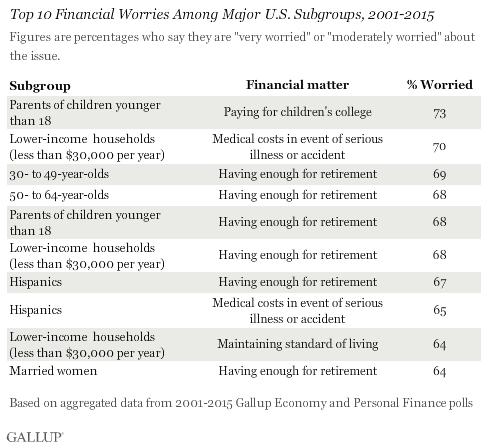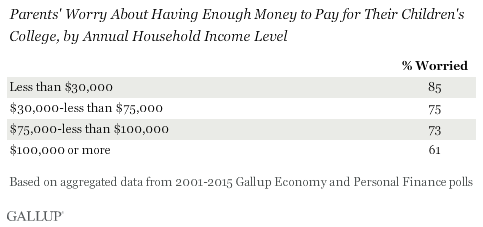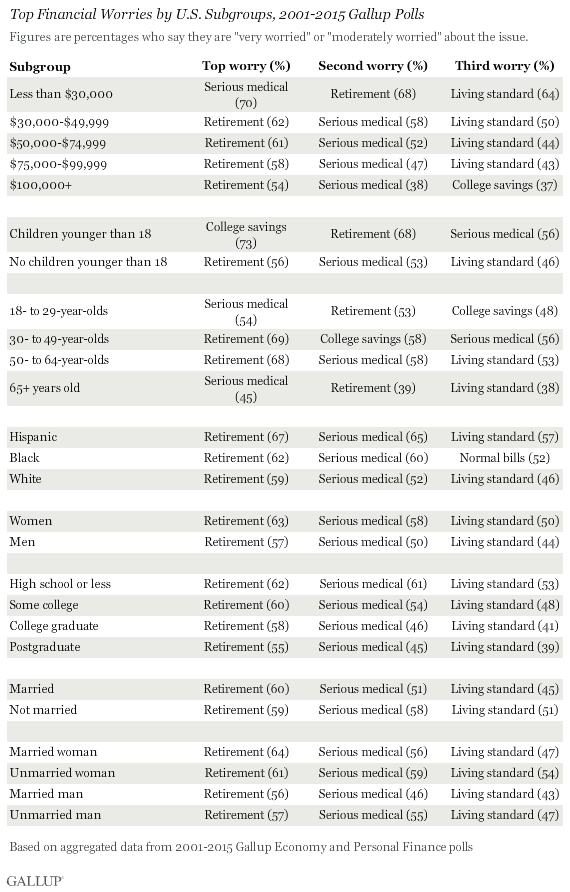Story Highlights
- Seven in 10 parents worry about college funding
- No other group worries more about any other issue
- Lower-income Americans worried about many financial matters
PRINCETON, N.J. -- More U.S. parents worry about having enough money to pay for their children's college education than other Americans worry about any common financial concerns. The 73% of parents of children younger than 18 who worry about funding college tops the 70% of lower-income Americans who worry about having enough money to pay for medical costs in the event of a serious illness or accident.

The results are based on aggregated annual data from Gallup's 2001-2015 Economy and Personal Finance survey. Since 2001, Gallup has asked more than 16,000 Americans how much they worry about each of eight separate financial matters, ranging from having enough money for retirement to making minimum payments on credit cards. The rank order of these fundamental financial concerns has not varied much over time, although the percentage expressing worry in any given year can vary depending on the strength of the economy.
Reflecting that retirement has been the top overall worry each of the 15 years Gallup has conducted the poll, six of the top 10 greatest financial worries by subgroup are about retirement. The six groups with the greatest worry about having enough money for retirement are 30- to 49-year-olds, 50- to 64-year-olds, parents of minor children, those living in lower-income households, Hispanics and married women.
Hispanics' worry about having enough money to pay for a serious medical issue and lower-income Americans' worry about maintaining their standard of living fill the remaining spots in the list of the 10 greatest financial concerns by subgroup.
The table at the end of this article shows the top financial worries for each U.S. subgroup. For most subgroups, having enough money for retirement ranks as the top concern, followed by medical expenses in the event of a serious illness or accident and maintaining one's standard of living.
Given that general pattern, parents' high degree of worry about college funding stands out. And the 73% worried about it is notable because not all parents likely expect their child to attend college, although many more parents may hope or expect their child to go to college than actually will.
Parents thus face twin challenges of paying for ever-escalating college expenses for one or more children and saving for their own retirement. And parents worry a great deal about both, but slightly more about college (73%) than retirement (68%).
As one might expect, parents living in higher-income households worry less about paying for their child's college than those in lower-income households. But a majority, 61%, of parents whose annual household income is $100,000 or more still worry about it.

Parents whose income is less than $100,000 are slightly more likely to worry about college funding (77%) than retirement funding (73%), while those whose income is $100,000 or more worry equally about each (61% college and 62% retirement).
Implications
Being a parent can be both rewarding and challenging. Some of parents' greatest challenges are financial, particularly if they hope to send their children to college. This is made clear by parents' worry about paying for college exceeding the level of worry for any other subgroup about any other financial matter. Parents worry more about college funding even more than the most financially vulnerable group -- low--income Americans -- worry about any financial matter.
High college tuition bills are a financial burden for many American families -- particularly those who are low or middle income. Because of high tuition bills, many students accrue large amounts of debt in college that puts them at a bit of a financial disadvantage once they enter into adulthood. Of course, the promise of higher education is that those who earn a degree will be able to secure a well-paying job and thus find financial security of their own, and Gallup polling finds Americans agree with this idea. Though it is well-documented that college graduates earn far more over their lifetime than those who do not graduate college, that finding is not enough to ease parents' worry about how they will pay for their children's education.
Survey Methods
Results for this Gallup poll are based on combined telephone interviews from Gallup's annual Economy and Personal Finance survey, conducted each April from 2001 through 2015. The combined sample is based on interviews with 16,302 randomly selected adults, aged 18 and older, living in all 50 U.S. states and the District of Columbia. For results based on the total sample of national adults, the margin of sampling error is ±1 percentage points at the 95% confidence level.
For results based on the total sample of 4,431 parents of children younger than 18, the margin of sampling error is ±2 percentage points at the 95% confidence level. All reported margins of sampling error include computed design effects for weighting.
Learn more about how Gallup Poll Social Series works.


